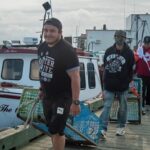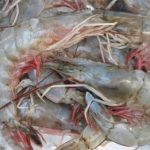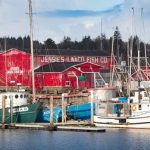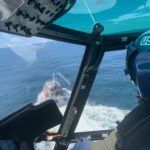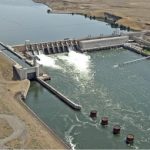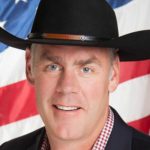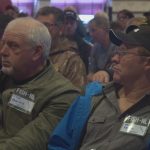Tag Archives: new england
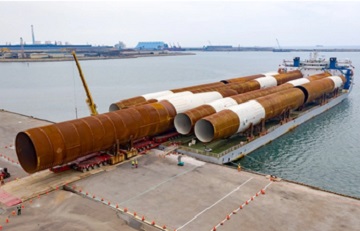
Mammoet Wins Contracts for Two ‘large’ Offshore Wind Projects in United States
Heavy lift and transport services firm Mammoet said Monday it had secured contracts for two large offshore wind projects for undisclosed clients in the United States, both of which begin in 2023. The contracts set for 2023 have been secured for work on two new offshore wind farms being built off New England’s coast. “In the coming year, Ampelmann’s motion compensated gangways will assist with the hook-up, cabling and commissioning of turbines on Vineyard Wind and Southfork Wind Farm, two of the first commercial offshore wind farms in the USA that will provide clean energy to the region,” Ampelmann said. >click to read< 17:50
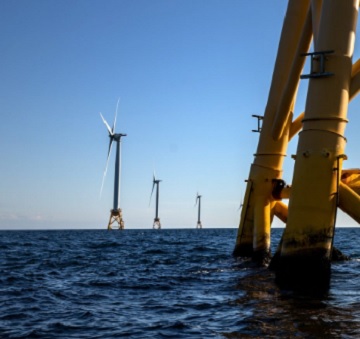
EXCLUSIVE: Federal Regulator Acknowledges Danger to Wildlife Caused by Offshore Wind Farms
Captain Jerry Leeman, who heads the fishing vessel F/V Teresa Marie IV, sent a copy of the Norwegian haddock study to Nies in a January 9 letter. “Thank you for your January 9 letter … A federal fisheries council acknowledged that some power cables for offshore wind turbines could harm certain fish, according to a letter seen by the DCNF. Multiple recent studies have demonstrated that a variety of commercially popular fish can be negatively impacted by their exposure to magnetic fields emitted by high voltage direct current cables, which can confuse their ability to navigate and, in some cases, leave them exposed to predators. “We were previously aware of this study and agree that it has concerning implications for the possible effects of high voltage direct current cabling on larval behavior and resulting predation rates,” Thomas Nies, executive director of the New England Fishery Management Council (NEFMC), said in a January 18 letter. >click to read< 20:01
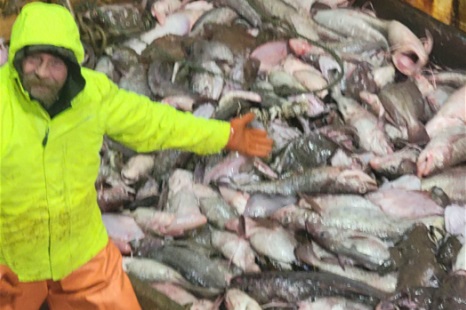
When things don’t add up. By Jerry Leeman
Sitting here towing along thinking back 20 years ago fishing in the Gulf of Maine. We used to land a lot of white hake. An average trip was always around 15k to 30k of hake 5k of monk tails on average. These days you worry of catching too many and you try to stay within the realm of your allowable catch because fish cost money to catch. Yes, even as crazy as that sounds boat quotas have been restricted from bad data collection to be so low, we have to purchase quota from other permits to maintain fishing. Then with these restrictions it puts a damper on markets. Imagine, markets that used to take in 200-500k of one specie a week then no longer are capable of taking in those fish because markets are not strong due to poor biomass data and allowable catches which have altered markets. >click to continue reading< 16:28
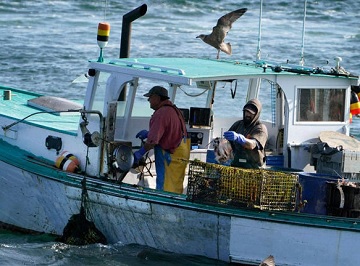
Green groups targeting blue-collar lobstermen are largely funded by dark money
Environmental groups that have led litigation targeting the lobster fishing industry have been heavily funded by various liberal dark money groups that don’t disclose their individual donors, a Fox News Digital review of tax filings found. For example, the Center For Biological Diversity has received millions of dollars from left-wing dark money groups including the Rockefeller Family Fund, the Patagonia Fund and Pew Charitable Trusts. The center has been the recipient of grants worth nearly $8 million from the Sandler Foundation, $1 million from the Wilburforce Foundation, $850,000 from Environment Now and another $815,000 from the Frankel Family Foundation, according to Influence Watch. Video, >click to read< 07:42
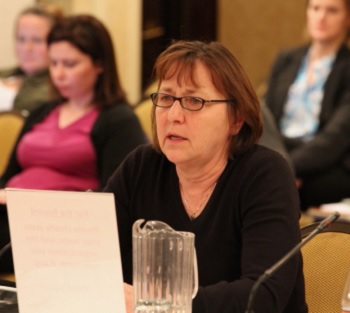
Council Presents 2022 Award for Excellence to Maggie Raymond
The New England Fishery Management Council honored Maggie Raymond, former Executive Director of Associated Fisheries of Maine and a 25-year participant in the Council process, by presenting her with the 2022 Janice M. Plante Award for Excellence. Council Chair Eric Reid called the recognition “long overdue.” “Maggie represents the epitome of someone dedicated to both the commercial fishing industry and sustainable fisheries management,” said Chair Reid. ““Today we’re highlighting Maggie’s contributions to our own Council process,” said Chair Reid, “but her work for fishermen and the fishing industry was not limited to the Council. She was a key member of the New England fishing community for over 27 years and continues to make contributions even in her supposed ‘retirement.’” >click to read< 13:50
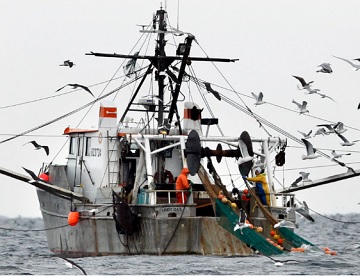
New monitoring rules for Northeast fishermen
Changes to U.S. rules about the monitoring of Northeast commercial fishing activities are going into effect this month with a goal of providing more accurate information about some of the nation’s oldest fisheries. The U.S. mandates observers to work onboard fishing boats to collect data and make sure fishermen adhere to rules and quotas. The National Marine Fisheries Service has adopted new monitoring rules for Northeast fishermen of groundfish, like haddock and flounder, to try to improve the accuracy of the data. >click to read< 11:57
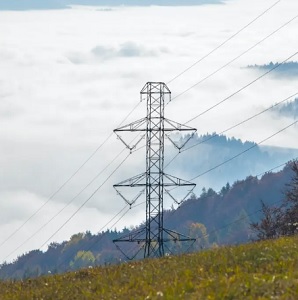
In Connecticut, frustration grows over lack of access to Canadian hydropower
State Sen. Norm Needleman, co-chair of the legislative Energy and Technology Committee, recently said in a radio interview that efforts to diversify the regional grid’s energy supply by importing more hydropower from Canada have been scuttled by New Hampshire and Maine, which turned down plans for more transmission lines through their states. Needleman said his comments about the northern states were made in the context of his general frustration with energy policy, which he finds “mind-numbingly complicated” and frequently contentious. “People are going to find fault with solar on farmland; there is consternation around offshore wind because it may impact the fisheries,” he said. >click to read< 10:16
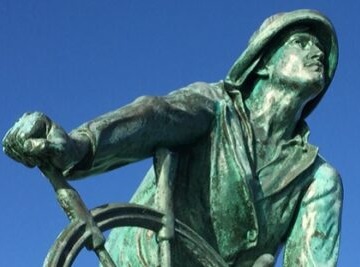
Cod: The New England Council has proposed a plan to restore cod by 2033
What that will mean is our fishing fleet would have to reduce their catch by whatever the council thinks will be helpful. Over the years NOAA has made reductions on cod and other species, based on their studies and science. Under law, they do not have to compare their findings. We need to update the Magnuson–Stevens Act that would require them to compare data before making restrictions on species of fish. Put this aside, if we want to bring back the cod, no fishing vessel can land cod over the next ten years. Great! So be it. Pay our fisherman to not catch cod. Farmers have a Farm Bill and pay farmers not to grow certain crops. So why can’t our government create a Fish Bill to do the same for the U.S. fishing industry? This could be paid for by increasing the duty on imported fish. This is a Win-Win solution. Sam Parisi, Gloucester, Mass. 19:27

Scientist calls 6-year delay in Maine lobster rules ‘mind-boggling’
Scientists dedicated to saving North Atlantic right whales from extinction say they are optimistic they can work with the fishing industry to save the species. But they were blindsided last month when Maine’s congressional delegation put language in the federal budget to delay for six years regulations that are designed to protect the whales. Amy Knowlton, a senior scientist at the Boston-based New England Aquarium, said the impact of a six-year delay in regulations could be “dramatic.” “It’s mind-boggling that this would be allowed to happen,” she said. But the Maine lobster industry has fought hard against new regulations designed to protect the whales, saying lobstermen aren’t to blame for the whales’ continued decline. Backed by Gov. Janet Mills and the state’s congressional delegation, the industry won a major victory with the six-year delay. >click to read< 15:20
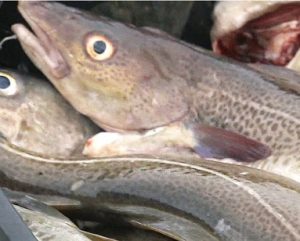
Fishing plan can rebuild long lost cod stock by 2033
Most of the cod now sold in the U.S. comes from overseas because many American fishermen avoid the fish-and-chips staple altogether. But the regulatory New England Fishery Management Council has approved a new strategy that it said has a 70% chance of rebuilding the stock by 2033. The proposal, which is awaiting final approval from NOAA, would use 10 years of low catch limits to try to rebuild the cod population in the Gulf of Maine. But some fishermen are unconvinced cod are ever coming back. Fishermen have grown used to choking quotas on cod catch and have moved on to other species, said Terry Alexander, a longtime fisherman from Harpswell, Maine, who targets haddock and monkfish these days. “I would like to have my codfish back, for sure. We could make some money on them. But that’s never going to happen,” >click to read< 16:02
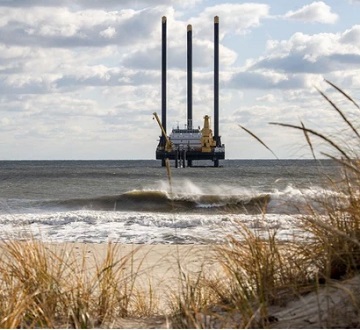
Follow the Science? US Ignored Own Scientists’ Warning in Backing Atlantic Wind Farm
US government scientists warned federal regulators the South Fork offshore wind farm near the Rhode Island coast threatened the Southern New England Cod, a species so venerated in the region a wooden carving of it hangs in the Massachusetts state house. The warnings were delivered in unpublished correspondence weeks before Interior’s Bureau of Ocean Energy Management authorized the 12-turbine South Fork plan in November 2021. And they serve to underscore the potential ecological consequences and environmental tradeoff of a coming offshore wind boom along the US East Coast. President Joe Biden wants the US to deploy 30 gigawatts of offshore wind by the end of the decade. >click to read< 10:15

Green Groups Ignore Genuine Risks To Whales From Offshore Wind Farms
Environmentalists want to crack down on the Maine lobster industry in the name of protecting endangered whales, but they turn a blind eye to the greater threat to whales from proposed offshore wind farms. The irony is almost as delicious as the lobster dinners at stake. Green groups such as the Center for Biological Diversity and Defenders of Wildlife routinely target commercial fishing by claiming that it causes ancillary harm to marine species protected under the Endangered Species Act and other federal laws. This includes the North Atlantic right whale, whose population of only 350 or so migrates up and down the Atlantic Coast and can cross prime lobster territory off New England. >click to read< 11:52

Wind industry group says turbine restrictions for whales could threaten commercial viability of projects
An organization that represents and lobbies for the wind industry has warned that a recommendation from federal scientists to limit turbines in offshore lease areas to protect the endangered North Atlantic right whale could threaten the commercial viability, efficiency and utilities contracts for some projects. In a letter first published by The Light last month, NOAA scientist Sean Hayes proposed establishing a “conservation buffer” zone or turbine-free area overlapping with wind development planned in Southern New England. But the American Clean Power Association (ACP), which represents the wind industry, said such a buffer would cause the removal of a “significant number” of turbines from several projects. >click to read< 07:29
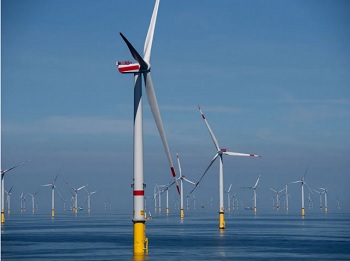
Offshore Wind Farms in New England Create Headaches for Both Man and Beast
“I don’t think ever in history has there been such a massive alteration of the ecosystem in such a short amount of time,” says the executive director of New Jersey-based Clean Ocean Action, Cindy Zipf. “We’re looking at 3,500 turbines as tall as the Chrysler Building, 2.2 million acres of ocean, and 10,000 miles of cable just in the Northeast in just the next seven years.” At the center of the conflict is the North Atlantic right whale and other endangered marine mammals that the Commerce Department’s National Oceanic and Atmospheric Association National Marine Fisheries Service are charged with protecting. Fewer than 350 right whales are left in the Atlantic Ocean, according to the fisheries service. >click to read< 08:14
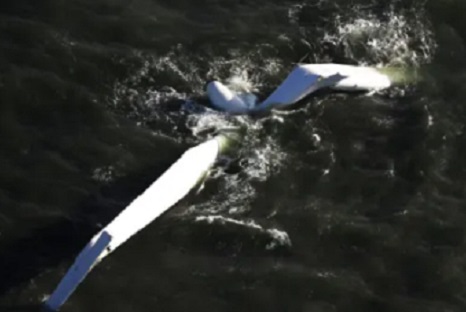
Plain Stupid: The Only Thing Dumber Than Wind Power Is Offshore Wind Power
Wind power comes with a staggering price tag, taking these things out to sea sends those costs into orbit: intermittent offshore wind power is six times the cost of gas-fired power that’s always available on demand. Placing giant industrial wind turbines miles offshore is costly enough, but the rising costs of attempting to maintain them (and the transmission cables connecting them) in a highly corrosive marine environment are positively punitive. So much so, that even the grandest of offshore plans have hit the skids, as Robert Bryce details below. >click to read< 14:55
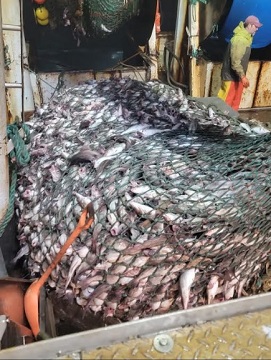
Jerry Leeman: So, let’s plug in what we know.
So, let’s run a logical thought, based on what our governments assumption on fish stocks is, with what we know. NOAA says there is nothing wrong with the biomass of white hake, but they cannot find adolescent hake. Well ask any lobstermen along the shorelines, they are seeing abundance of juvenile hake and cod in their traps. Imagine Lobstermen and inshore fishermen across a vast area all saying the same thing? NOAA says there’s nothing wrong with the biomass of haddock but same thing, they can’t find small fish. Well, what do we know?!! >click to continue reading< 08:33
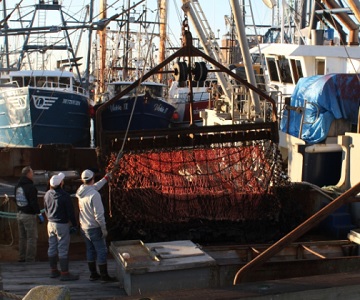
Regulators see hard years ahead for the scallop fishery, New Bedford’s cash cow
Scientists report that young scallops off the eastern seaboard have been struggling to grow to maturity for nearly a decade now, constraining one of the nation’s most lucrative fisheries to its lowest biomass in more than 20 years. In a presentation before the New England Fishery Management Council on Wednesday, the council’s scallop analyst Jonathon Peros projected that the latest regulations adopted by the council will cap next year’s scallop harvest at 25 million pounds, a steep drop from a record harvest of 61 million pounds recorded just four years earlier. >click to read< 09:45
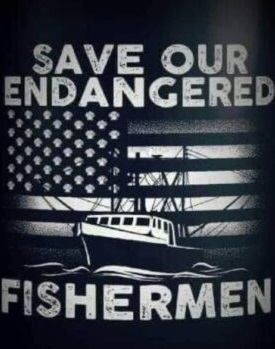
All for one and one for all – With Jerry Leeman
Well, if NOAA goes through with these cuts this coming year to groundfish stocks I’m afraid there won’t be a fishing season next year. They have created choke species thru faulty assessments. I don’t know why I say assessments because they really haven’t done enough to make any logical cuts to any stock. To my family and friends who are lobstermen. You will watch the bait prices double overnight once the last groundfish boat is done. No more bait will be landed thru the groundfish efforts. That’s right no redfish racks, no hard bait and no skates. This will happen. I’ll do my best to argue everyone’s circumstances and the errors of their data and sampling methods using on the job experience offshore for 14 years at sea in the last 21 years. The entire groundfish fleet Captains are united in this argument that the data is corrupt and wrong in many ways. All offshore fishermen spend more time trying to avoid fish due to the made-up choke species brought to us by bad science and lack of know how. >click to continue reading<, 15:03
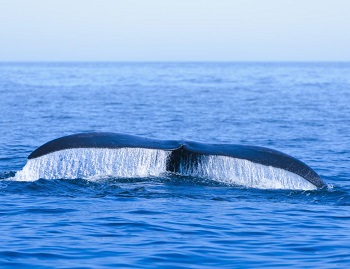
Wind Projects Off New England Put Endangered Right Whales at Risk, Warns NOAA Scientist
Planned wind projects off the New England coast threaten to harm the region’s dwindling population of endangered right whales, according to a US government marine scientist. The warning from a top National Oceanic and Atmospheric Administration official, obtained by Bloomberg under a Freedom of Information Act request, underscores the potential legal and environmental perils of offshore wind development along the coast. President Joe Biden has a goal of deploying 30 gigawatts of offshore wind within the decade. Both initial construction of wind projects and decades of expected operation threaten to imperil right whales in southern New England waters, Sean Hayes, chief of the protected species branch at NOAA’s National Northeast Fisheries Science Center, said in a May 13 letter to Interior Department officials. >click to read< 11:26

Are we really going to let them kill our ocean and our fishing way of life?
Generations of fishermen are no longer fishing because of the restrictions and unfair quota from faulty science. Like I said in earlier posts, we went from 400 active boats down to 17 barely active boats. Meanwhile conservation groups will tell you that we are wiping the ocean out from overfishing. That is so wrong on so many levels, it isn’t even funny. Hard to believe New England was considered to be sustainable for haddock and lobsters. Then fishing efforts went down and now we are no longer sustainable. The only thing that’s changed is windmills are on their way to the Gulf of Maine and the management at NOAA and NMFS are allowing it to happen. Why would they not talk to the people who have committed their lives to the job of harvesting our ocean?! Well, I can’t speak for everyone, but I have a few hypotheses. By Jerry Leeman. >click to read< 16:38
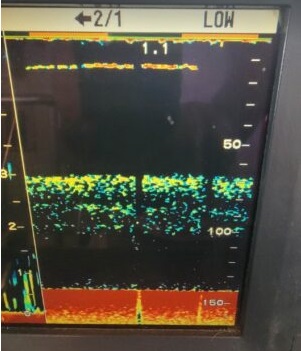
Jerry Leeman – Why it is wrong to assume anything
I’ll use this photo to prove a point. NOAA uses a computer to pick where their assessments on fish stocks will take place. Here lies the problem. It’s in random spots, and they never make the same tow again at the same time of the year because they use a computer model that knows nothing of fishing. NOAA is taking the assumption that fish live everywhere. That’s pretty funny because if you knew anything about fishing at all, fish species don’t hang on every piece of bottom all day and night. They just don’t. Not only do fish have tails, but they also swim up into the water columns and travel with the feed and breeding cycles and changes of the seasons. >click to read the rest< by Jerry Leeman.16:16
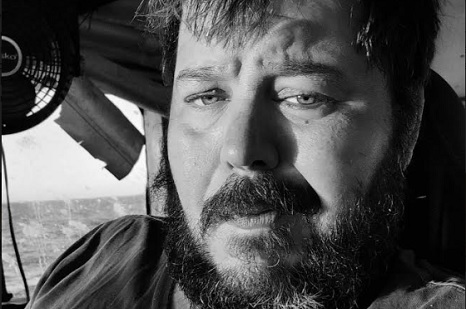
Well, the windmill agenda is damning us all. Fisherman Jerry Leeman
Well, the windmill agenda is damning us all. The evidence all points in the same direction from the standpoint of the sea. I’m a fisherman and have been all my life here in New England. I was raised on an island in Maine with a bunch of fishermen and fishing families. Everyone has their own style and way of harvesting the ocean. The unspoken truth is we all are for the betterment of the ocean, stewards of the sea by trade. That’s why we have management teams or supposed to which manage the stocks which the government and state control and not the actual harvesters. Here in New England, we are the most regulated fishermen in the world and that’s no lie. We have video tracking daily reporting and 100 % observer coverage. Your every move is being watched. All the fishermen are now switching their efforts and styles of groundfishing to fish without fishing is my best way to describe it. >click to read< 22:34
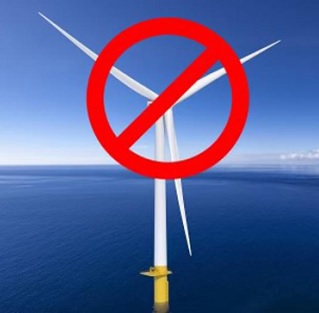
Scuttled Offshore Wind Plans Are Good News For Ratepayers, North Atlantic Right Whales
The hype about offshore wind energy keeps getting scuttled by reality. That’s the clear conclusion from last month’s announcement that Spanish utility company, Avangrid, was halting work on the proposed 1,200-megawatt Commonwealth Wind project because it was “no longer viable.” The company also announced it was delaying the start of another offshore project, the 800-megawatt Park City Wind project. While Avangrid has since said it would still move forward on the Commonwealth project, here’s the undeniable truth: the fewer offshore wind turbines get built, the better it will be for ratepayers, the commercial fishing industry, and the critically endangered North Atlantic Right Whale. >click to read< 07:48
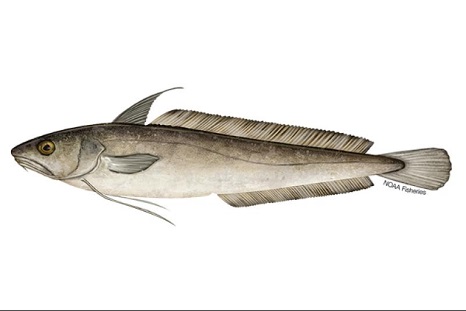
Jerry Leeman – A supply line disruption
Allow me to explain what is about to happen. We are fishing on false assumptions that there are no white hake. If you are a fisherman, I’m sure you can tell that is untrue. Regardless of the price of fuel rising and this hake quota brought to us by NOAA and NMFS. It’s become a supply line disruption. The infrastructure needs a steady supply of fish to keep steady markets open. Here lies the problem. Fishermen are going out of their way to avoid a specie that live in the same habitat as other species. So, for the sake of the hake restriction, they are avoiding those areas. So that means the supply line is cut for the other species. Which means cutting houses and fish markets are paying for folks to sit idle. No supply no product no income. So, they have to lay off folks. Please read the rest. >click to read< By Jerry Leeman 08:40
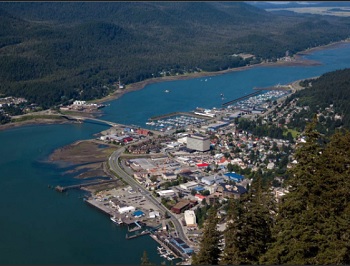
Is Juneau running out of diesel?
Juneau, Alaska is one of two capitals that is only accessible by water or air (the other is Honolulu, Hawaii. Like New England, almost every home in Juneau is heated by diesel oil. This small city of 30,000 souls has two rather large tank farms that store millions of gallons of fuel barged up from Seattle. Diesel is the lifeblood of Juneau. It has three harbors packed with fishing vessels that run on diesel. Two mines outside the city use diesel. The city’s backup power generators run on diesel. If this town ran out of diesel, it would be an economic catastrophe if not a humanitarian crisis. Some buildings only use diesel heat. If heat was shut down, the water supply would also have to be shut down (frozen lines). It would mean the closure of schools and, possibly, health facilities. So, the first step is to see if there is data on Alaska’s inventory. Video, >click to read< 10:56
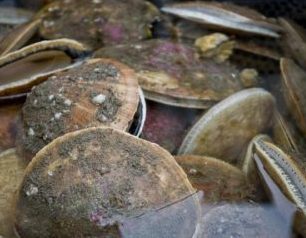
New Research Supports Opening of Currently Closed Scallop Areas
Data presented to the New England Fishery Management Council last month provide the latest evidence that long-closed areas of the Northwest Atlantic can be sustainably opened to the scallop fishery. The Fisheries Survival Fund, which represents the vast majority of full-time Atlantic Sea scallop fishermen, has long believed that these areas can be safely opened, and supports efforts to do so in light of this new evidence. The Northern Edge of Georges Bank (more formally known as Closed Area II Habitat Area of Particular Concern), has been closed to all commercial fishing activity since 1994. >click to read< 10:00

Letter: Right whale entanglements – the undocumented and unknown statistics

NEFMC to decide next moves on scallop license allocation leasing in Gloucester Tuesday
Scallop allocation leasing, the practice of boat owners selling days and tonnage from a fishing license to other vessel owners to harvest in restricted zones, has been at the center of debate in the Port of New Bedford since the NEFMC held two scoping meetings at the New Bedford Whaling Museum on May 11 and May 25 respectively. NEFMC invited stakeholders to attend nine meetings in Massachusetts, Rhode Island, New Jersey, North Carolina, Virginia, and two webinars. According to the Council, the vast majority, 78%, of the 286 commenters (several repeated, inflating the total number to 305) spoke against the proposed allocation leasing project during the scoping process. >click to read< 14:45
Regulators to vote on controversial scallop leasing plan Tuesday – After months of heated debate between scallop fleet owners, captains and crew, fisheries regulators are set to decide on a proposal to allow leasing in New England’s lucrative scallop fishery. More than 75% of the nearly 300 people who commented during the public process said they opposed leasing — most of them captains and crew out of New Bedford, >click to read<
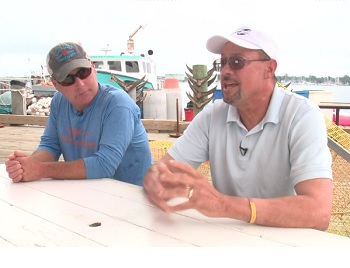
Maine lobstermen say ‘red listing’ a threat to their livelihoods without cause
“I truly believe the lobstermen have done everything we’ve been asked by National Marine Fisheries and the DMR,” said Gerry Cushman, who has been lobstering in Port Clyde for 38 years. “We’re not the bad guys here,” he said. “You ask us to do it, we do it. So why are you putting us on the red list? “ The Seafood Watch listing is recommending consumers not buy American lobster from either the U.S. or Canada. Maine is the primary producer of that lobster for the U.S. Cushman said he believes Seafood Watch has taken the action against Maine fishermen to pressure them to stop fighting proposed regulations in court. Steve Train, a lobsterman from Long Island in Casco Bay, echoed those points, saying Maine fishermen have followed all the whale protection rules, even though they have also been challenging them in court. Video, >click to read< 19:37
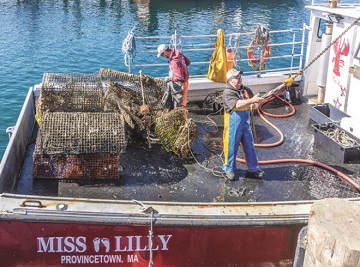
Lobstermen Don’t Deserve Monterey Bay Rating
This past February Monterey Bay hinted it might consider red listing Northeast lobster, not because the fishery isn’t healthy but because of the danger of entanglement in lobster trap lines for the highly endangered North Atlantic right whales. The announcement, which became official on Sept. 6, has spurred an intense campaign to reverse this classification. Some of the data suggest this recommendation might be an overreaction. Another thing missing from this story is how much our fishermen are doing to avoid entanglements: removing “ghost gear,” doing 10 m.p.h. in the bay, and, most significantly, holding back until May, which keeps their gear out of the water when the whales are here. >click to read< 08:36


































